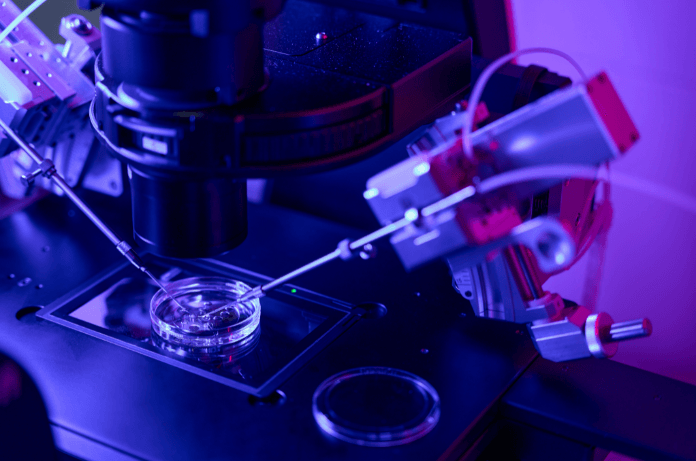Would you have a baby with yourself? Or perhaps with three other people? What sounds like the plot of a dystopian novel is edging closer to scientific reality. The UK’s fertility watchdog, the Human Fertilisation and Embryology Authority (HFEA), has revealed that technology for lab-grown eggs and sperm—known as in-vitro gametes (IVGs)—could become viable within the next decade. With significant investment from Silicon Valley, scientists are moving at an amazing pace toward making it possible.
The implications are vast. IVGs could break age barriers in conception, allow same-sex couples to have biological children, and even pave the way for “multiplex parenting”—where three or more individuals contribute genetic material to create a child. However, alongside these advancements come ethical dilemmas, potential genetic risks, and the need for urgent discussions on how fertility laws should evolve to keep pace with science.
The Science Behind IVGs
At the heart of this technology is the ability to create human sperm and eggs from genetically reprogrammed skin or stem cells in a laboratory. This means that individuals who previously had no biological means of reproducing—such as those with infertility issues, postmenopausal women, or same-sex couples—could theoretically have children with their own genetic material.
The concept has already been tested in mice, where lab-grown eggs were successfully used to produce healthy offspring, including cases where two biological fathers contributed genetic material. While the leap to human application has yet to be made, startups like Conception and Gameto claim they are closing in on this milestone. According to the HFEA, timelines for clinical use vary, with some experts suggesting it could happen within two to three years—an optimistic estimate—while others believe it could take up to a decade.
Despite the excitement, the clinical use of IVGs is currently prohibited under UK law. The primary concern is safety, as any unintended genetic changes introduced during the process would not only affect the individual conceived but also be passed down to future generations.
The Ethical Dilemmas
With the potential to reshape fertility treatment, IVGs introduce a host of ethical questions. One of the most controversial possibilities is “solo parenting,” where both sperm and egg are derived from a single individual. While this may seem like an ultimate form of self-sufficiency, the genetic risks are staggering.
Normally, humans inherit two copies of every gene—one from each parent. This provides a safeguard against recessive genetic disorders, as a faulty gene from one parent is typically counterbalanced by a healthy version from the other. However, in solo reproduction, a child would inherit two identical copies of each gene, dramatically increasing the likelihood of genetic defects.
Frances Flinter, emeritus professor of clinical genetics at King’s College London and an HFEA member, did not mince words when addressing this issue: “In a way, it’s the complete extreme of incest. And it is much more dangerous, so nobody would ever consider that to be a safe thing to do.”
The idea of “multiplex parenting”—where more than two individuals contribute genetic material to a child—also raises complex ethical and legal questions. Questions such as Who would have parental rights? How would genetic relationships be legally recognized? And what emotional and psychological impact would this have on children conceived through such methods?
The Future of Fertility Laws
Recognizing the speed of these developments, the HFEA is pushing for a comprehensive review of fertility laws. Current regulations were established before the possibility of IVGs was even considered, meaning there is no clear legal framework for how to handle the latest technological breakthrough, should it become viable.
Peter Thompson, the chief executive of the HFEA, highlighted the potential benefits of IVGs, particularly for those struggling with infertility. He noted that if IVGs are proven to be safe, effective, and publicly accepted, they could significantly increase the availability of human sperm and eggs. It provides new fertility options for men with low-quality sperm and women with diminished ovarian reserves.
However, proving safety remains a significant hurdle. Any errors in the genetic reprogramming process could have irreversible consequences not just for the individual but for all their descendants. Scientists and regulators will need to ensure that the risks do not outweigh the potential benefits.
Scientific Breakthrough or Ethical Minefield?
Julia Chain, chair of the HFEA, acknowledged the almost sci-fi nature of the discussions surrounding IVGs. In a moment of levity, she quipped, “It feels like we ought to have Steven Spielberg on this committee.” But the reality is that these ethical and medical debates are no longer futuristic—they are shaping up and happening now.
There is no denying that IVGs could redefine reproductive medicine. For couples who currently have no biological means of conceiving together, this technology could offer a deeply personal solution. Yet, with the ability to create sperm and eggs from skin cells, questions about genetic manipulation, designer babies, and unforeseen health risks loom large.

